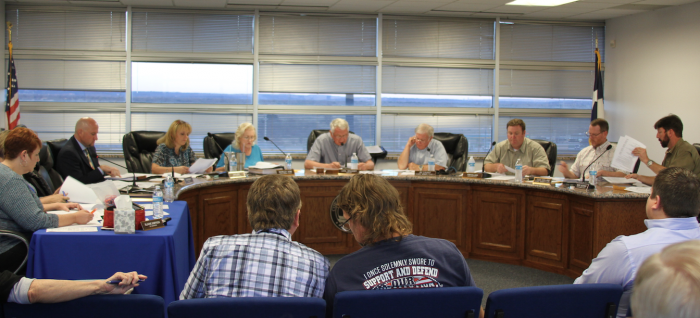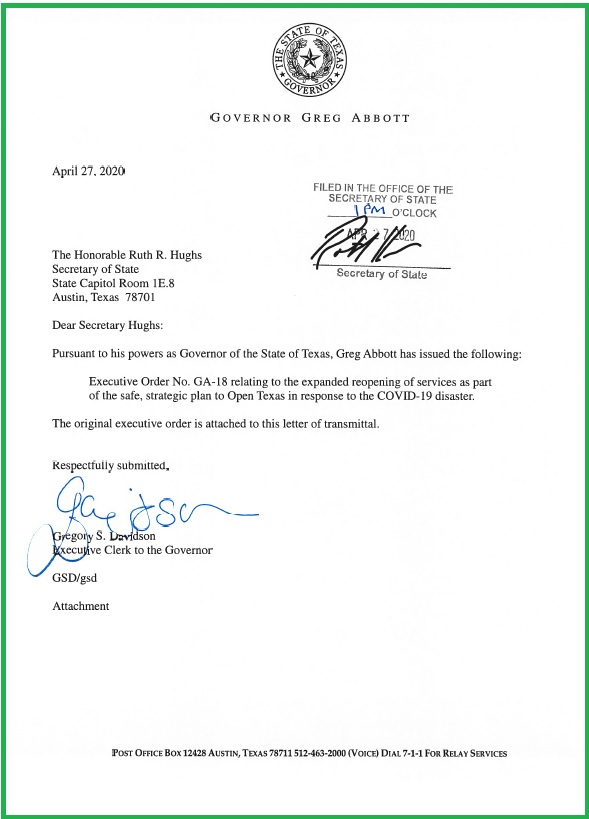Granite Shoals 'in a pickle'

Glynis Crawford Smith/The Highlander
At a special meeting of the Granite Shoals City Council Monday, Feb. 20, members delve into options for major street repair with less than half the funding.
By Glynis Crawford Smith
The Highlander
Granite Shoals City Council Member Anita Hisey summed up the situation in a special called meeting Monday night, Feb. 20: “We're in a pickel.”
The meeting was called after the council heard the report Feb. 14 that major U.S. Department of Agriculture (USDA) funding of a project to rennovate the city's three main traffic arteries is a virtual impossibility.
Lengthy pre-application consults with a USDA representative indicated the city was qualified for a 55-45 match. On the strength of those talks, the city council proposed a $6.8 million, three-road project with $3 million in city bond money as a match. The citizens voted “yes” in November.
Council members had in their hands communications that had gone on for a year with the USDA, carefully outlining city plans and the bond issue proposal, with nothing but encouragement received in return. Just this month the bad news came. The city could qualify for a grant, but not to exceed $50,000, and only for a project financed on a 40-year loan.
City financial adviser Chris Allen of First Southwest Company Company told council they had the authority to sell the bonds and spend the money. But consulting engineer Greg Haley, P.E., of K.C. Engineering could deliver no joy for what the city could get for $3 million.
The project was proposed for base-up renewal of Valley View Lane, Prairie Creek Road and Phillips Ranch Road. To use the funds now would result in lower quality or shorter distance for the work.
In shorter distance along each roadway, work might not reach citizens who voted for the bonds only because the roads in front of their own homes would be improved. With lower quality work, hot mix resurfacing on existing roadways, the life of the roads might not exceed 10 years, where the proposed project called for a 20-year life expectance, funded with 20-year bonds.
Allen said the city would have the option of proceeding with their application for the limited USDA grant funding.
“Why would we take out a 40-year loan for roads with a 10-year life,” asked Council Member Todd Holland.
Allen talked in detail about the various ways and terms for which bonds might be issued and the rising interest environment; none of it to fully fund the original proposed project.
He confirmed a point about use of the money that was brought forward by Mayor Pro Tem Shirley King, “By the language on the ballot, the $3 million would have to be spent on all three streets somehow.”
When the council voted in August to put the bond question on the November ballot the vote carried with Holland and Hisey and fellow council members Mark Morren and Eric Tanner out voting Mayor Carl Brugger, Mayor Pro Tem Shirley King and Council Member Tom Dillard. Thier rationale was not to spend more money on study and engineering plans when citizens had not even endorsed spending. Brugger, King and Dillard followed the reasoning of City Manager Ken Nickel that waiting would tell whether the grant could be won.
The one point on which the council could emhatically agree Monday night was that strong letters of complaint would be going out to the USDA and anyone else who will listen to what they consider agregious behavior. Council indignation was especially fired when they learned they were at least the third city to be mislead by USDA staff who “misspoke” when representing how much funding was available.
“I think the USDA misled us,” said Brugger. “The date to file for the May election has passed. If we want to put this back on the ballot it will be November at least before we can apply.”
Three citizens had come to the mourful proceedings.
Katie Logan, a former member of the Street and Water Advisory Group, said she would not have voted for the bond issue if she'd thought all of her own street wouldn't not have been addressed and she thought many other citizens would feel the same.
Martin Jakubowsky couched a 'do over' vote on city-wide ballot as a “moral” imperative.
“We do need these roads fixed,' he said. “And I don't mind a small tax increase for that. But, if you don't inform voters, it coult hurt future bond issues.”
In that, Davant was in agreement when he spoke earlier in the meeting. He drew the conversation to a long discussion of the serious problems with drainage along Prairie Creek Road, where only curb and gutter can carry flood water away from the Elm Creek floodplain and into the lake.
"It would be Prairie Creek that gets the bulk of the money spent," he said.
Michael Steenbergen, the candidate opposing Brugger for Mayor in the May election, was the final citizen speaker. He faulted Brugger and Nickel for the pickel the city now faces.
“The mayor shows us all the letters; there were five opportunities to ask the question: 'How much is available?' I fault the city manager and the mayor.
He was even more aggressive in accusations about council and staff motivtions, but Dillard drew the line, as he has in past confrontations with Steenbergen in council meetings, and language he called “insulting.”
“No one on the council went to voters with deception in their hearts or in their minds,” he said.
“Whatever we can do to fix this mistake, we're going to get thejob done to the best of our ability,” added Morren.
After talking about a multitude of floodplain and right-of-way problems that equal expense along Prairie Creek Road and road base challenges on Phillips Ranch Road the council turned back to Halely.
Brugger noted that Aug. 22 would be the deadline for a November ballot application and asked him to work with Nickel on a contract for plans the council could take to the voters.






